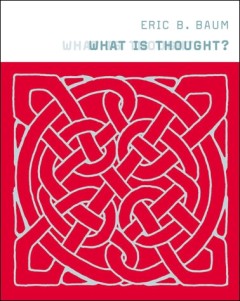Filter by

What Is Thought?
Bradford Books.In What Is Thought? Eric Baum proposes a computational explanation of thought. Just as Erwin Schrodinger in his classic 1944 work What Is Life? argued ten years before the discovery of DNA that life must be explainable at a fundamental level by physics and chemistry, Baum contends that the present-day inability of computer science to explain thought and meaning is no reason to do…
- Edition
- -
- ISBN/ISSN
- 9780262310574
- Collation
- 1 online resource (495 pages)
- Series Title
- -
- Call Number
- -

Mind in nature :Dewey, cognitive science, and a naturalistic philosophy for l…
"A reassessment of the influence of John Dewey's mature work, especially "Experience and Nature" on recent trends in cognitive science"--OCLC-licensed vendor bibliographic record.
- Edition
- -
- ISBN/ISSN
- 9780262373463
- Collation
- 1 online resource
- Series Title
- -
- Call Number
- -

Out of the cave :a natural philosophy of mind and knowing
"A grand, unified "natural philosophy of mind" that draws equally from the embodied cognition and cognitive neuroscience literature"--OCLC-licensed vendor bibliographic record.
- Edition
- -
- ISBN/ISSN
- 0262367238
- Collation
- 1 online resource.
- Series Title
- -
- Call Number
- -

The blind spot :why science cannot ignore human experience
"An argument for the inclusion of the human perspective within science and how it makes science possible"--OCLC-licensed vendor bibliographic record.
- Edition
- -
- ISBN/ISSN
- 9780262377744
- Collation
- 1 online resource
- Series Title
- -
- Call Number
- -

What's left of human nature? :a post-essentialist, pluralist, and interactive…
A philosophical account of human nature that defends the concept against dehumanization, Darwinian, and developmentalist challenges. Human nature has always been a foundational issue for philosophy. What does it mean to have a human nature ? Is the concept the relic of a bygone age? What is the use of such a concept? What are the epistemic and ontological commitments people make when they use t…
- Edition
- -
- ISBN/ISSN
- 9780262347969
- Collation
- 1 online resource (xxxii, 301 pages) :illustrations
- Series Title
- -
- Call Number
- -

The conceptual mind :new directions in the study of concepts
"The study of concepts has advanced dramatically in recent years, with exciting new findings and theoretical developments. Core concepts have been investigated in greater depth and new lines of inquiry have blossomed, with researchers from an ever broader range of disciplines making important contributions. In this volume, leading philosophers and cognitive scientists offer original essays that…
- Edition
- -
- ISBN/ISSN
- 0262326876
- Collation
- 1 online resource (xiii, 714 pages, 12 unnumbered pages of plates) :illustrations (some color)
- Series Title
- -
- Call Number
- -

Folk psychological narratives :the sociocultural basis of understanding reasons
"A Bradford book."An argument that challenges the dominant "theory theory" and simulation theory approaches to folk psychology by claiming that our everyday understanding of intentional actions done for reasons is acquired by exposure to and engaging in specific kinds of n.OCLC-licensed vendor bibliographic record.
- Edition
- -
- ISBN/ISSN
- 9780262275996
- Collation
- 1 online resource (xxiv, 343 pages)
- Series Title
- -
- Call Number
- -

The case for qualia
"A Bradford book."First presenting philosophical defences, then scientific and finally specific criticisms of opposing views including discussions on the Churchlands' 'neurophilosophy', this book discusses philosophical and scientific defences of Indirect Realism and counterarguments to the attacks of qualiaphobes.OCLC-licensed vendor bibliographic record.
- Edition
- -
- ISBN/ISSN
- 9780262286497
- Collation
- 1 online resource (viii, 384 pages)
- Series Title
- -
- Call Number
- -

Language, music, and mind
"A Bradford book."OCLC-licensed vendor bibliographic record.
- Edition
- -
- ISBN/ISSN
- 9780262282024
- Collation
- 1 online resource (xi, 169 pages) :illustrations
- Series Title
- -
- Call Number
- -

Knowledge and mind :a philosophical introduction
"A Bradford book."This is the only contemporary text to cover both epistemology and philosophy of mind at an introductory level. It also serves as a general introduction to philosophy: it discusses the nature and methods of philosophy as well as basic logical tools of the trade. The book is divided into three parts. The first focuses on knowledge, in particular, skepticism and knowledge of the …
- Edition
- -
- ISBN/ISSN
- 0585184178
- Collation
- 1 online resource (xiv, 253 pages) :illustrations.
- Series Title
- -
- Call Number
- -
 Computer Science, Information & General Works
Computer Science, Information & General Works  Philosophy & Psychology
Philosophy & Psychology  Religion
Religion  Social Sciences
Social Sciences  Language
Language  Pure Science
Pure Science  Applied Sciences
Applied Sciences  Art & Recreation
Art & Recreation  Literature
Literature  History & Geography
History & Geography